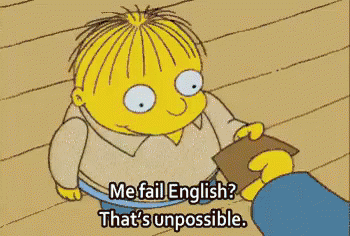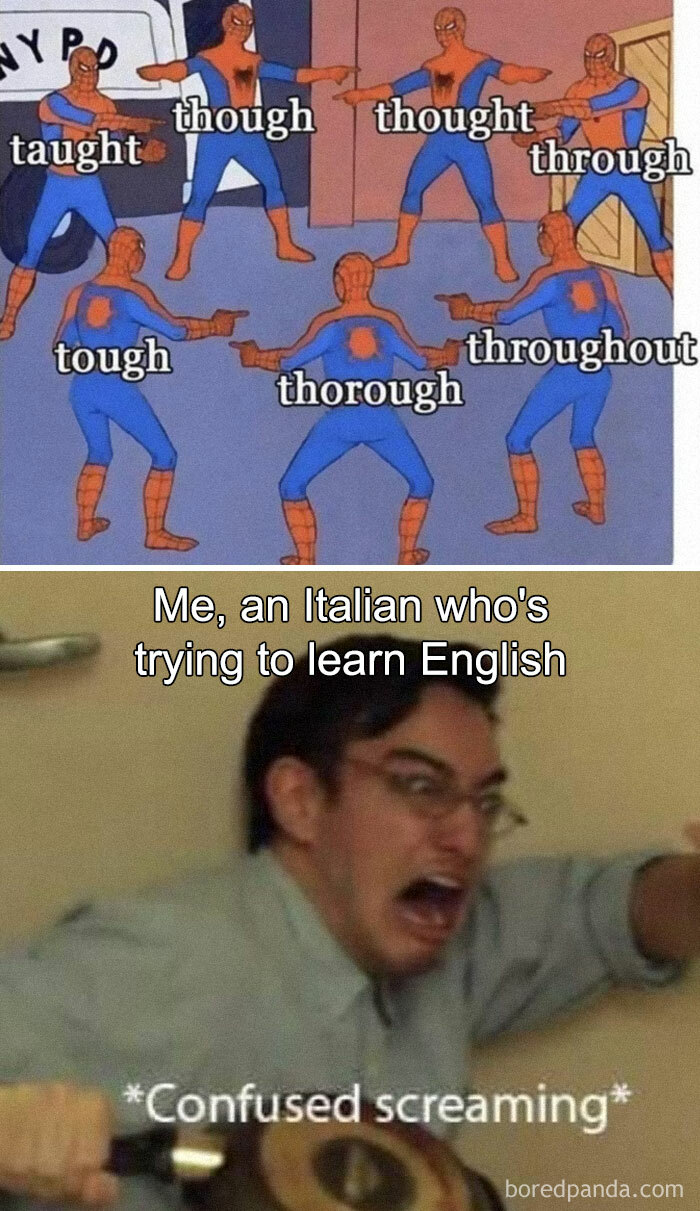If you read read as read and not read, you have to re-read read as read so you can read read correctly so it can then make sense
Memes
Post memes here.
A meme is an idea, behavior, or style that spreads by means of imitation from person to person within a culture and often carries symbolic meaning representing a particular phenomenon or theme.
An Internet meme or meme, is a cultural item that is spread via the Internet, often through social media platforms. The name is by the concept of memes proposed by Richard Dawkins in 1972. Internet memes can take various forms, such as images, videos, GIFs, and various other viral sensations.
- Wait at least 2 months before reposting
- No explicitly political content (about political figures, political events, elections and so on), !politicalmemes@lemmy.ca can be better place for that
- Use NSFW marking accordingly
Laittakaa meemejä tänne.
- Odota ainakin 2 kuukautta ennen meemin postaamista uudelleen
- Ei selkeän poliittista sisältöä (poliitikoista, poliittisista tapahtumista, vaaleista jne) parempi paikka esim. !politicalmemes@lemmy.ca
- Merkitse K18-sisältö tarpeen mukaan
I’m so English I got it right first try 😎😎😎

I've never noticed, but is part of the joke with that Simpsons bit that that sentence is technically grammatically correct? Even unpossible is a real word, just outdated.
Well just learned something new about an episode I have watched probably 30 times! Thanks for that one.
Yeah, what's missing is the punctuation and his delivery but it could be "Me? Fail English? That's unpossible!"
Yeah, but at least you don’t have to learn whether a fridge is male or female.
How do gendered languages even deal with non-binaries?
Badly. Really badly..
Gendered languages can also have a neutral gender. For example, in German masculine/feminine/neutral 'the' is: der/die/das
But yeah, as others said, these don't have much to do with the gender identity. For example:
- the person → die Person (feminine)
- the girl → das Mädchen (~~objectifying women~~ neutral)
The trick is to carefully check underneath the ice dispenser.
People who speak English as their first language don't even get this stuff right
I mean we kind of get it, but i would guess it would be no more than a native Italian speaker understanding how to use irregular verbs and all their tenses properly.
Source: am learning Italian, get wildly confused every now and then haha.
Welcome to English!
“What are the rules?”
(Satanic laughing)
“Do you even follow the rules”
“No but if you break them in a way that doesn’t feel intentional we’ll laugh at you”
"Well take the rules of all the languages of the ones that conquered England and you get a pretty good idea. Oh and drop the grammatical gender, we don't do that anymore."
It's easier to understand when you look at English history and realize that English is essentially three different languages (old Saxon, Norse, and Norman) badly put together (a great example of this being meats having different names than the animals they come from, since the people farming said animals spoke Saxon, but the people eating them spoke Norman), with plenty of Latin, Greek, French, and other languages sprinkled on top, all written with a limited alphabet that's incapable of properly reflecting the pronunciation of those languages' words.
It doesn't help, though ,that at some point the English alphabet got simplified with things like ō becoming things like oo, without taking into account that things like oo were already being used to represent different sounds, or that at one point over a period of a few decades in the middle ages for some reason all English speakers seemed to decide to randomly switch around the pronunciation of all their vowels without changing how they wrote them (!?), or that, while all languages borrow words from others, unlike most others English for some reason doesn't bother to adapt their orthography or grammar (a French or Catalan speaker will have no problem understanding why façade is written like that and pronounced fassade instead of fackade, for instance, but I'm sure most English speakers won't be so lucky, especially if they write it facade... and then you've got things like fiancé, or the plural of radius being radii, and so on)... and you end up with the oos in book, blood, door, and boot all being pronounced differently... and, for some reason (probably the borrowing one), the one in brooch being pronounced a particular fifth different way... 🤷♂️
Buffalo Buffalo buffalo buffalo buffalo Buffalo buffalo.
Police police police police. Who polices the police police? The police police police police police police.
That was thoroughly thought through.
touch and though really show the fucking weirdness of English best.
I hate that its the world language. Where did Esperanto go. Its an actually made up language, composed or many ones, easy to learn.
Language sucks. The history of English, German, damn Norwegian, Dutch, Danish, Swedish, are all so damn weird. And we literally live a few days by bike apart from each other.
Why do there need to be multiple languages really? Its such a barrier.
If everyone would just learn esperanto, we could focus on learning something actually useful, like signing (gesture language). Then we have two languages we can talk with about everyone in the world.
Everyone learning esperanto is a bigger ask than overhauling the spelling of what is already an internationally spoken language.
English is the Taco Bell menu of languages
I have no idea what that means, but it sounds accurate
Thou thought thoroughly. Though throughout tough times, through tenacity, 'tis taught.
Trough!
Taut and tout as well
Just memorize them by rote. There's nothing actually connecting them via spelling; they're completely different words with completely different backgrounds and that's a thing you have to get used to in English.
Remember English is a creole of a bunch of different languages and that's why it is the way it is. It doesn't really have rules like that aside from some basic grammar.
Yeah it's like a mad concoction of Germanic, Brythonic, old French, and Norse influences. So many loan words!
Hahhaa tell that to the Shi poem in mandarin. 94 times the frikin shi word!
Of course, this can be confusing, but wouldn't every single language have some confusing parts? As a non native English speaker who tried to learn other languages (without much success for now) I find English to be actually rather easy.
What would you propose as an easier alternative for a "universal" language?
Out of the languages I know, non have the nonsensical letter-sound pairings that English has. French has some combinations you wouldn't expect (like eaux= o) but they are consistent in every word they appear. Irish also has some wild letter combinations, but I know to little about that to know, if it's as confusing as English.
To illustrate, I would say you could write the words above a lot easier and understandably:
Taut, thou, thaut, thru, thruout, thorou, tuff
Grammatically, English is pretty easy. But the pronunciation is so inconsistent, that it is necessary to hold spelling bees in school. My language doesn't need spelling bees for example.
Still inconsistent. Better would be toht, ðow, þoht, þruw, þruwawt, þərow, təf in American English.

